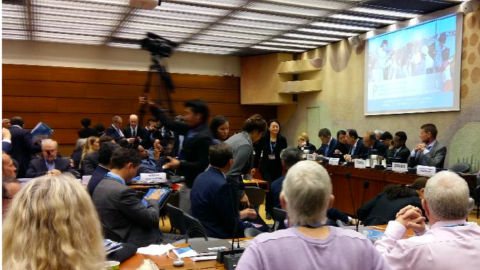
WHO briefing on Universal Health Coverage (UHC)
- Philippines described the experience of the enactment of a UHC law, learning from countries like Japan and Thailand that had achieved UHC earlier. Now engaged in the more detailed implementation planning and this includes anticipating and responding to obstacles.
- Estonia described the experience of enrolling people into an insurance scheme: what was learned and how the scheme was modified to reduce the cost barrier is lower and make enrolment automatic (treating UHC as a right, not something that needs to be applied for).
- WHO AFRO office described the Harmonisation for Health initiative which provides regional support to governments in Africa strengthening their health systems. WHO has done assessments of countries’ preparedness for UHC roll-out and pointed to useful tools. Innovation is needed in countries where roll-out of universal health insurance schemes is especially challenging.
- The UHC Partnership promotes UHC through policy dialogue on planning, health systems governance, health financing strategies and their implementation, and enabling effective development cooperation in countries. Now working in 66 countries. For an example of its work and approach see http://www.nationalplanningcycles.org/planning-cycle/NPL
- The head of the UHC Partnership listed what he considered ten key UHC success factors:
- Strong link between service coverage and finance
- Planning needs to be bottom-up and contextualised including bottleneck analysis
- Concrete focus on realistic measurable outcomes
- Investment in measuring those outcomes
- Disaggregated data: averages fail to reveal inequities in coverage and financing
- Health quality as a human rights issue
- Social contract with citizens is needed, since success entails their understanding
- Need for new refreshed toolbox including digital health
- Focus on the demand side, tackling issues like loss of confidence in immunization
- Investment in science to ‘learn as we go’
- UHC2030 is a partnership of governments, international organisations, civil society organisations, the private sector, academia, and media, who have signed the UHC2030 Compact focused on UHC implementation. Key principles:
- Leaving no one behind: a commitment to equity and a rights-based approach
- Transparency and accountability for results
- Evidence-based national health strategies and leadership
- Engagement of citizens, communities, civil society and private sector, as well as government
- International cooperation based on mutual learning across countries